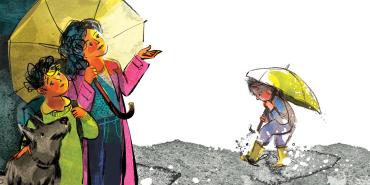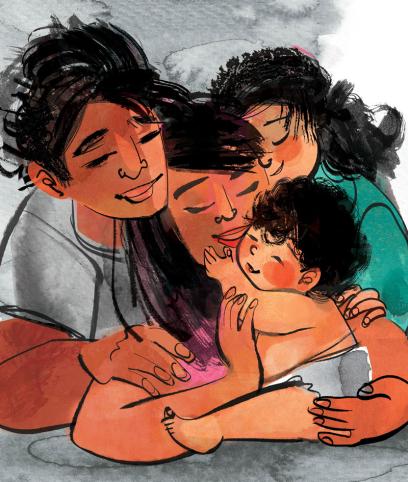Taylor is having another bad day. The third-grader arrived late, threatened a classmate during recess, cried in frustration over colored markers, then fell asleep in the calm-down corner. For the third time this week. What is going on?
Although Taylor is a fictitious kiddo, nearly every teacher and school staff member knows this scenario well: A child repeatedly lashes out, withdraws or exhibits some other troubling behavior. There may be repeated bruising, fearful body language or lack of hygiene. Red flags. What do you do?
Because school staff are mandatory reporters—required by law to report suspected child abuse, maltreatment or neglect—the answer is often to immediately call child welfare authorities. But while such reporting is well-intended, mandatory reporters as well as child welfare agencies are seriously questioning whether it is appropriate in every case.
Here’s the reality: Research shows that mandatory reporting often does more harm than good. Most reports are unsubstantiated upon further investigation, and many can trigger a cascade of harmful consequences such as intrusive home inspections—even strip searches of children—and painful family separation.
“Mandatory reporting often places educators in the difficult position of accidentally tripping up on harm rather than helping,” says AFT President Randi Weingarten. But many feel ill-prepared to discern the moment at which child services are needed, and fear serious consequences if they do not report.
A new paradigm: Mandatory support
Recently, the idea of mandatory supporter, rather than mandatory reporter, has taken hold. Coined by JMACforFamilies, a child advocacy organization, mandatory support involves more careful consideration of alternative tools and resources to consider before escalating to the child welfare system.
Weingarten calls it “a broader menu of ethical options to caring professionals who practice this more expansive approach.” Tools include collaboration, consultation and connection to school families.
“Schools and the folks who work in them can play such an important role in helping students, families and other caregivers access the support they need, and feel more connected,” says Weingarten, who addressed an AFT webinar on the topic June 22. “Educators, especially specialized instructional support personnel like school counselors, school nurses, school psychologists and school social workers coordinate diverse support like medical checkups, clothing, mental health services, and you’re often right there in the school building.” But mandatory reporting can throw a wrench into the works.
“The idea of switching from a reporting model to a supporting model would allow people to ask for the support that they need without fear of being punished for asking,” says Joyce McMillan, founder and executive director of JMACforFamilies.
A broken system
The current mandatory reporting system is problematic on many levels, starting with a lack of adequate training. Only about half of educators receive pre-service training in mandatory reporting, and many say in-service training is inadequate and/or focuses on legal responsibility rather than warning signs, effective responses and resources.
Mandatory reporting can also be inappropriately one-size-fits-all, where every case gets a “five-alarm” response rather than allowing for less urgent, gentler actions. “All you have to do is suspect abuse and you are advised to contact [child services],” says Tamika Abdullah, a school social worker in New York City, a member of the United Federation of Teachers and a member of the AFT webinar panel.
This sort of response often destroys relationships and trust. “If the school calls in a report, the parents are less likely to trust the school, the parents are less likely to send the children back and/or the parents come to the school and sometimes get into physical altercations with the teacher and/or staff,” says Abdullah.
Mandatory reporting also disproportionately harms Black and Indigenous children, who are more likely to be involved in the child welfare system—often to their detriment. This is sometimes due to implicit bias in mandatory reporters, who are expected to make rapid, subjective judgments with no training to help them overcome ill-informed opinions about a family that may have different life circumstances than their own.
And with so many people reporting incidents, including those that could have been handled in a different way, welfare services are overwhelmed. More than 4 million reports are made annually, and less than 10 percent are credible; 44 percent of educators’ reports are unsubstantiated.
Meanwhile, reports can lead to intrusive inspection of households and children themselves; they frequently lead to family separation. “The investigations can do real harm,” says Mary Zortman Cohen, a school psychologist and member of the Boston Teachers Union. The risk of losing a legal relationship with one’s parent has doubled for U.S. children. And for what? Statistics show that sending kids to foster care can exacerbate negative educational outcomes like poor attendance and low academic engagement. Worse, children are more likely to experience sexual abuse, physical abuse, violence, homelessness and lack of access to healthcare than they experienced at home.
What we can do
Mandatory support offers a different path. Focusing on students’ well-being, it utilizes solutions the union has long championed, says Weingarten—including trauma-informed practices, community schools and bargaining for the common good.
Its basic tenets use preventive “healing gestures” to celebrate, comfort and inspire students; continue professional growth on implicit bias; combat stigma; support student privacy; collaborate; make caregivers the first call; consider a consultation that anonymizes the family; and share power with families by ensuring they are aware of triggers, know their rights and share their strengths as well as vulnerabilities.
Webinar panelists described their mandatory support successes. Anthony Arinwine, an instructional coach, kindergarten/first-grade teacher in San Francisco and member of United Educators of San Francisco, recalled a child he suspected was not getting enough food at home; Arinwine arranged an anonymized consultation to determine if this was reportable. He eventually learned the family had been displaced by Hurricane Katrina and had not yet found resources in their new home. “We were able to help connect the mom with food stamps and other things that would support her in raising her kids,”—without breaking up the family, he said.
Tom Stinson, a school nurse and a member of the Saint Paul Federation of Educators, described a home visit program codified by his union contract that, in one case, helped him support a child who was chronically absent. “I learned that the student was diagnosed with cancer, and the family was barely holding on,” he said. He excused the absences, sent in a teacher for homebound students and offered other resources that kept the family engaged.
Zortman Cohen described how BTU helped build teacher skills to address a shortage of counselors, psychologists and social workers, and advocated for additional staffing. Today, the number of social workers has doubled since Zortman Cohen was hired two decades ago.
These examples showcase how mandatory reporters can become mandatory supporters. “We want reporters to be a little bit more discerning,” said Chelsea Prax, an AFT associate director who organized the webinar—and to have the tools they need to better determine when a report is essential, and when another intervention could better serve the student.
Ultimately, said Weingarten, “Our first priority is our students’ well-being.”
[Virginia Myers / Illustrations by Susan Gal, morgangaynin.com/artists/susan-gal/]


